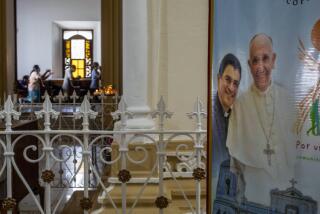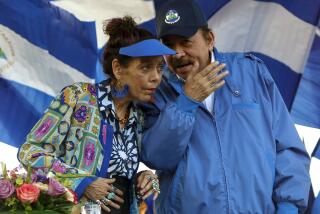Contras and Sandinistas Hold First Talks on Nicaraguan Truce
- Share via
SANTO DOMINGO, Dominican Republic — The first formal talks aimed at a cease-fire in the Nicaraguan war opened here Thursday under the mediation of Nicaragua’s Roman Catholic primate.
The mediator, Cardinal Miguel Obando y Bravo, met for 2 1/2 hours with a four-man Contra negotiating team at the headquarters of this Caribbean capital’s Catholic archdiocese. He is to receive a Sandinista government delegation there today, then meet again with the rebels.
Obando said he brought specific suggestions for both sides on how to reconcile their widely divergent truce proposals. After meeting with the rebels, he said, “There is a certain flexibility. I think we have to keep working with optimism.”
He chose Santo Domingo as a compromise site for the indirect negotiations, ending a monthlong dispute between the Sandinistas, who wanted the talks in Washington, and the Contras, who insisted they be held in Central America.
The most difficult issue now appears to be the scope of the negotiations. The Sandinista proposal, made three weeks ago, calls on the Contras simply to surrender, accept amnesty and return to civilian life. The Contras insist on major political changes in Nicaragua before laying down their weapons.
Obando said he is seeking at least a temporary truce by Christmas, even if major issues remain unsettled.
The talks are a result of a Central American peace accord that requires governments in the region to take all possible steps to halt their guerrilla wars.
Through six years of fighting, until last month, the Sandinista government had rejected any kind of talks with the Contras and insisted instead that peace be negotiated with the United States, which finances their insurgency.
As he dispatched a four-man delegation to the talks here, Nicaraguan President Daniel Ortega continued to make an issue of the Contras’ ties to Washington and accused the Reagan Administration of seeking to continue the war.
“Our first impression (of the rebels’ truce plan) is that this is a document prepared by the most right-wing sectors of the Reagan Administration, intended to kill the chances for agreement on a cease-fire,” Ortega told reporters in his capital of Managua.
Ortega called the proposal a “crude, stupid maneuver” to demand new political concessions in addition to those Nicaragua accepted when it signed the five-nation peace plan last August. The plan requires unrestricted press freedom and “total political pluralism.”
Contra leaders denied that U.S. officials helped draft their proposal. They said their demands were consistent with the aims of the peace accord.
“It would be just as ridiculous for us to say that every move by the Sandinistas is dictated by Moscow,” said Bosco Matamoros, a spokesman for the rebel delegation.
The rebels’ truce conditions include abolition of the following: Sandinista party control of the news media, state collective farms, military conscription, party-controlled neighborhood vigilante groups and food rationing. None of these steps is mentioned by the regional peace accord, but rebel leaders say they are needed to make Nicaragua an open society.
Victor Hugo Tinoco, Nicaragua’s chief negotiator, said he had come here with authority to discuss only the “technical and operational aspects” of a cease-fire.
U.S. Army Col. Richard Schaden, who is assigned by the State Department to advise the Contras, arrived on the flight with their delegation and was later seen at the same hotel. He was not in uniform.
Matamoros, the rebel spokesman, said Schaden “is not part of our group” and added: “I don’t know what he is doing here.” Schaden could not be reached for comment.
The technical issues of a cease-fire could be sticky, too, because the Contras insist that their troops “dominate” rural areas comprising more than half the nation and should be kept in place during a truce. The Sandinista proposal would move rebel troops into three relatively small cease-fire zones.
More to Read
Sign up for Essential California
The most important California stories and recommendations in your inbox every morning.
You may occasionally receive promotional content from the Los Angeles Times.










